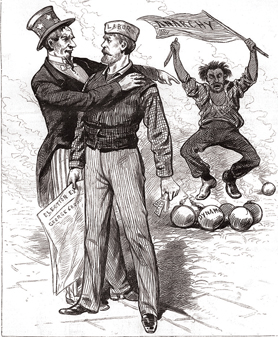Plan Concocted to Blow Up E. V. Crandall’s Factory
Bombs found all capped and fused and ready to explode – Flight of those who were in the plot – confession of an associate now in jail.
Long Island City, April 11, 1893 – The apparent intention of a gang of Anarchist employees to blow up their employer, E.V. Crandall of Maspeth, his factory and about forty of his employees who are not Anarchists, was the appetizing discovery which Mr. Crandall made about breakfast time this morning.
Maspeth is a little manufacturing village, just out of Long Island City, upon Newtown Creek. It is noted as possessing among its many exhilarating beauties, such as horse-meat sausage factories, chemical works that smell to high heaven, and bone boiling and other concerns devoted to advanced arts, a colony of the most active and aggressive Anarchists about New York.
When not engaged in attempting the lives of local capitalists, a few of whom still survive, they vary the monotony by murdering each other and burning barns.
Mr. Crandall is a large employer of labor in conducting his factory, in which he manufactures whiting, putty and alum.
He has had among his employees about ten of these human firebrands, who have made his life one of almost continual excitement and kept him on the verge of nervous prostration for a long time.
Once the works were totally destroyed by an incendiary fire; once Mr. Crandall’s life was attempted, and now three particularly murderous-looking dynamite bombs have been found nestling in close proximity to the factory walls with caps and fuses ready for action. Just how many more of these pleasant companions may be hidden about is unknown.
Otto Eckholdt is in custody, and his fellow Anarchists have flown because he proposes to confess. Eckholdt was the fireman at the works, and is under arrest charged with having fired the works when they were burned in December, 1891.
He was seen in his cell in the Long Island City Jail this afternoon by a New York Times reporter, and talked freely and proved to his own satisfaction that he was deeply injured citizen. He said that in addition to his job as fireman at the works he conducted the International Hotel, the headquarters for the village Anarchists. He declared that he had been betrayed by his fellow Anarchists and charged with various crimes which he did not commit because he would not join in some bloody plots.
For that reason he gave up the hotel, he says, and resigned from the ranks.
He charged that Henry Ruppercht, Mr. Crandall’s foreman, also an Anarchist, made the bombs – that he saw him make them.
He denied that he ever murdered a man, as charged, or that he had any hand in the burning of the works or in the burning of the big cooperage works next door to his hotel last September. He proposed to clear himself and lay all the blame where it belonged for the various episodes like arson and murders that had enlivened Maspeth since Herr Most established the Anarchists colony in the village four years ago. This he would do, he said, when he was summoned before the Grand Jury Wednesday or Thursday and not before.
From Mr. Crandall’s account, Eckholdt is anything but lamblike. His employer says that he once borrowed money of him to get out of a shooting scrape, in which he had perforated a fellow Anarchist. On the occasion of the fire, he was seen to be hoisted by fellow employees out of that part of the building from which soon afterward flames burst forth.
When Constable Hock attempted to arrest him for this offense, he endeavored to pour a kettle of boiling water over the officer.
Mr. Crandall says he has been “bled” unmercifully by the gang, that he has been at their mercy, and that recently one of his employees said to him:
“The works won’t be burned next time. We’ll blow them to h—-.”
Mr. Crandall adds that he is done with this sort of employee now for all time, that he now has a man in the place of every one of the eight or ten who have been with him up to yesterday, and that he had competent watchmen who will prevent any bomb work in the future.
The village constables are trying to corral some more of the gang.
Originally printed in the New York Times, April 12, 1893.
________________________________________
MORE DYNAMITE AT MASPETH
Ten Pounds of It Found In Mr. Crandall’s Engine Room
It was placed under the floor in a tin box – Eckholdt, the alleged incendiary, showed where it was concealed – He was taken to the factory by two deputy sheriffs – will tell all he knows to the grand jury – he talks to a “New York Times” reporter.
LONG ISLAND CITY, April 12 – The nerves of Proprietor E. V. Crandall and the forty employees in his whiting and putty works at Maspeth, L.I. will not stand many such discoveries as those made this morning and Tuesday.
When the Anarchist plot to blow them all some distance toward the planet Mars was found out Tuesday morning, and the three loaded bombs were discovered placed against the building, the effect was the reverse of exhilarating.
When the discovery of an additional ten pounds of dynamite in the building itself was made this morning, their appetites for lunch departed.
As told in today’s New York Times, Otto Eckholdt, the Anarchist fireman employed in the boiler room of the factory, was looked up in the Queens County Jail in Long Island City upon the charge of having fired the works when they burned down a year ago. He was so anxious to turn state’s evidence and assist in the capture of his fellow Anarchists, who have thrown up their positions in the factory and fled, that he volunteered to lead a searching party in a hunt for more dynamite through the factory this morning. A little before 10 o’clock he was taken from the jail to Maspeth by two Deputy Sheriffs.
He led the way to the engine room and directed the workmen to take up a section of the flooring. This was done and a most startling discovery was made.
In a tin box, 15 inches long by 12 inches wide and 4 inches deep, were found 12 twelve bags of dynamite. Each cartridge weighed about a pound, and was 8 inches long and covered with oiled linen.
Eckholdt declared that this magazine of the explosive was all there was in the building, to his knowledge. To make certain of this the search was kept up, but no additional find resulted. Eckholdt was then taken back to his cell in the Long Island City Jail and again locked up, to stay until the Grand Jury shall be ready to investigate the matter.
Eckholdt told a New York Times reporter that he knew his life was in serious peril, now that he had proclaimed his intention of turning state’s evidence; but declared that his connection with the followers of Herr Most had been so hateful to him that he preferred his new peril to his old life. Maspeth, he added, was a hotbed of Anarchists who were in constant communication with their sympathizers in New York, and he intimated that Mr. Crandall’s steam piping and other materials had been freely appropriated by his Anarchist employees to make bombs with. These bombs, he added were for use locally and abroad as occasion might require.
Some time ago, Mr. Crandall discovered that his stock of bladders, in which he kept the putty as it was manufactured, was disappearing at a rapid rate.
It was not until about the tenth big incendiary fire in Maspeth’s vicinity that the mystery was explained. Then it was found that the Anarchists had been filling these bladders with naphths and kerosene and using them in their incendiary work.
Mr. Crandall told a New York Times reporter that the prisoner Eckholdt, Henry Ruppercht, his foreman, now fled, and Ernest Thordsmith, his missing engineer, all Anarchists, were the most expert machinists he ever saw. Thordsmith, he added, was a genius. He could make anything conceivable out of an unpromising bit of old iron. Good workmen as all of them were, Mr. Crandall is quite willing that they should stay missing and not return to his factory to scheme and plot and appropriate his plant piecemeal.
He declares that he understands what must have been the delightful sensations that Daniel experienced in the lions’ den, and doesn’t believe that even Daniel would have enjoyed that sort of life for any length of time.
It was his fellow-Anarchists who denounced Eckholdt, and he in turn denounces his ex-associates as demons, severally and collectively.
Thordsmith talked with Mr. Crandall from a safe distance today over the telephone from Brooklyn, and declared his innocence. Upon Mr. Crandall’s insisting upon interview at close range, he promised to visit Mr. Crandall tomorrow and tell all he knew of the whole affair.
Warned by his lively experiences of the last few days, Mr. Crandall has discharged every employee suspected of the remotest connection with the Anarchist colony and has trustworthy watchmen on guard at the works now, night and day.
Originally printed in the New York Times, April 13, 1893.



